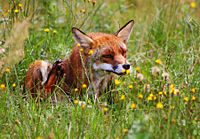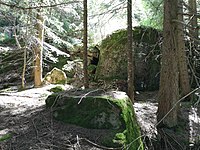|
Wildness
  Wildness, in its literal sense, is the quality of being wild or untamed. Beyond this, it has been defined as a quality produced in nature[1] and that which is not domesticated.[2] More recently, it has been defined as "a quality of interactive processing between organism and nature where the realities of base natures are met, allowing the construction of durable systems"[3] and "the autonomous ecological influences of nonhuman organisms."[4] Cultural perceptions of wildnessPeople have explored the contrast of wildness versus tameness throughout recorded history. The earliest great work of literature, the Epic of Gilgamesh, tells a story of a wild man Enkidu in opposition to Gilgamesh who personifies civilization. In the story, Enkidu is defeated by Gilgamesh and becomes civilized. Cultures vary in their perception of the separation of humans from nature, with western civilization drawing a sharp contrast between the two while the traditions of many indigenous peoples have always seen humans as part of nature. The perception of man's place in nature and civilization has also changed over time. In western civilization, for example, Darwinism and environmentalism have renewed the perception of humans as part of nature, rather than separate from it. Wildness is often mentioned in the writings of naturalists, such as John Muir and David Brower, where it is admired for its freshness and otherness. Henry David Thoreau wrote "In wildness is the preservation of the world". Some artists and photographers such as Eliot Porter explore wildness in the themes of their works. The benefits of reconnecting with nature by seeing the achievements of wildness is an area being investigated by ecopsychology. Attempts to identify the characteristics of wildness are varied. One consideration sees wildness as that part of nature which is not controllable by humans. Nature retains a measure of autonomy, or wildness, apart from human constructions.[5] In Wild by Design, Laura J. Martin reviews attempts to manage nature while respecting and even generating the wildness of other species. Another version of this theme is that wildness produces things that are natural, while humans produce things that are artificial (man-made).[6] Ambiguities about the distinction between the natural and the artificial animate much of art, literature and philosophy. There is the perception that naturally produced items have a greater elegance over artificial things. Modern zoos seek to improve the health and vigour of animals by simulating natural settings, in a move away from stark man-made structures. Another view of wildness is that it is a social construct, and that humans cannot be considered innately ‘unnatural. As wildness is claimed to be a quality that builds from animals and ecosystems, it often fails to be considered within reductionist theories for nature. Meanwhile, an ecological perspective sees wildness as "(the degree of) subjection to natural selection pressures", many of which emerge independently from the biosphere. Thus modern civilization - contrasted with all humanity – can be seen as an 'unnatural' force (lacking wildness) as it strongly insulates its population from many natural selection mechanisms, including interspecific competition such as predation and disease, as well as some intraspecific phenomena. Wildness in animalsThe importance of maintaining wildness in animals is recognized in the management of Wilderness areas. Feeding wild animals in national parks for example, is usually discouraged because the animals may lose the skills they need to fend for themselves. Human interventions may also upset continued natural selection pressures upon the population, producing a version of domestication within wildlife (Peterson et al. 2005). Tameness implies a reduction in wildness, where animals become more easily handled by humans. Some animals are easier to tame than others, and are amenable to domestication. Rating scales for mouse wildnessIn a clinical setting, wildness has been used as a scale to rate the ease with which various strains of laboratory mice can be captured and handled (Wahlsten et al. 2003):
In this sense, "wildness" may be interpreted as "tendency to respond with anxiety to handling". That there is no necessary connection between this factor and the state of wildness per se, given that some animals in the wild may be handled with little or no cause of anxiety. However, this factor does clearly indicate an animal's resistance to being handled. Degrees of domesticationA classification system can be set out showing the spectrum from wild to domesticated animal states:
This classification system does not account for several complicating factors: genetically modified organisms, feral populations, and hybridization. Many species that are farmed or ranched are now being genetically modified. This creates a unique category of them because it alters the organisms as a group but in ways unlike traditional domestication. Feral organisms are members of a population that was once raised under human control, but is now living and multiplying outside of human control. Examples include mustangs. Hybrids can be wild, domesticated, or both: a liger is a hybrid of two wild animals, a mule is a hybrid of two domesticated animals, and a beefalo is a cross between a wild and a domestic animal. Wildness in human psychologyThe basic idea of ecopsychology is that while the human mind is shaped by the modern social world, it can be readily inspired and comforted by the wider natural world, because that is the arena in which it originally evolved. Mental health or unhealth cannot be understood in the narrow context of only intrapsychic phenomena or social relations. One also has to include the relationship of humans to other species and ecosystems. These relations have a deep evolutionary history; reach a natural affinity within the structure of their brains and they have deep psychic significance in the present time, in spite of urbanization. Humans are dependent on healthy nature not only for their physical sustenance, but for mental health, too. Wildness in political philosophyThe concept of a state of nature was first posited by the 17th century English philosopher Thomas Hobbes in Leviathan. Hobbes described the concept in the Latin phrase bellum omnium contra omnes, meaning "the war of all against all." In this state any person has a natural right to do anything to preserve their own liberty or safety. Famously, he believed that such a condition would lead to a "war of every man against every man" and make life "solitary, poor, nasty, brutish, and short." Hobbes's view was challenged in the eighteenth century by Jean-Jacques Rousseau, who claimed that Hobbes was taking socialized persons and simply imagining them living outside of the society they were raised in. He affirmed instead that people were born neither good nor bad; men knew neither vice nor virtue since they had almost no dealings with each other. Their bad habits are the products of civilization specifically social hierarchies, property, and markets. Another criticism put forth by Karl Marx is his concept of species-being, or the unique potential of humans for dynamic, creative, and cooperative relations between each other. For Marx and others in his line of critical theory, alienated and abstracted social relations prevent the fulfillment of this potential (see anomie). David Hume's view brings together and challenges the theories of Rousseau and Hobbes. He posits that in the natural state we are born wicked and evil because of, for instance, the cry of the baby that demands attention. Like Rousseau, he believes that society shapes us, but that we are born evil and it is up to society to shape us into who we become. Thoreau made many statements on wildness:
See also
References
Sources
|
||||||||||||||||||||||||||||